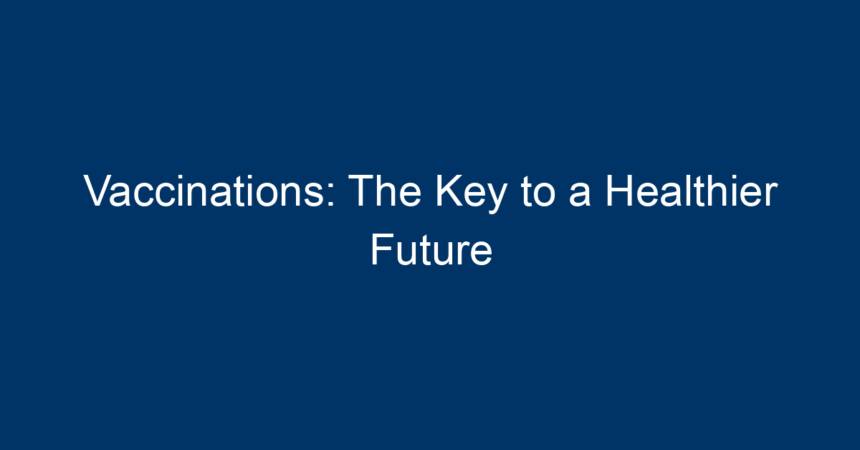Vaccinations play a crucial role in safeguarding public health, acting as a first line of defense against various infectious diseases. In recent years, the dialogue around vaccinations has intensified, sparking both public interest and debate. This article explores the significance of vaccinations, their historical context, how they work, and their impact on society. By unraveling the complexities surrounding vaccinations, we aim to highlight their importance as the key to a healthier future.
The Historical Context of Vaccinations
The journey of vaccinations began centuries ago, with Edward Jenner’s pioneering work in the late 18th century. Jenner introduced the cowpox vaccine to combat smallpox, a disease that had ravaged populations for centuries. His discovery laid the groundwork for the field of immunology, ultimately leading to the development of more vaccines against various diseases.
Since the time of Jenner, countless lives have been saved through vaccination programs. The eradication of smallpox in 1980 stands as one of the most remarkable achievements in public health. This monumental success demonstrates the power of vaccinations in combating infectious diseases and offers hope for future eradications.
How Vaccinations Work
Vaccinations function by stimulating the immune system to recognize and fight specific pathogens, such as viruses or bacteria. This process involves introducing a harmless component of the pathogen, known as an antigen, into the body. The immune system responds by producing antibodies, which can identify and neutralize the pathogen if the body encounters it again in the future.
Types of Vaccines
-
Inactivated or Killed Vaccines: These contain pathogens that have been killed or inactivated, making them incapable of causing disease. An example is the polio vaccine.
-
Live Attenuated Vaccines: These use a weakened form of the pathogen, which can still replicate but does not cause illness. The measles, mumps, and rubella (MMR) vaccine falls into this category.
-
Subunit, Recombinant, or Conjugate Vaccines: These contain only parts of the pathogen, such as proteins or sugars, rather than the whole organism. The HPV vaccine is an example of this type.
- Messenger RNA Vaccines: A newer technology, mRNA vaccines (like the Pfizer and Moderna COVID-19 vaccines) use genetic material from the virus to prompt the immune response.
The Role of Herd Immunity
A critical concept associated with vaccinations is herd immunity. When a significant portion of the population is vaccinated against a contagious disease, it reduces the likelihood of virus transmission, protecting those who cannot be vaccinated—such as infants, elderly individuals, and those with compromised immune systems. Herd immunity is essential for preventing outbreaks of diseases that were once common, such as measles or whooping cough.
The Impact of Vaccinations on Public Health
The public health benefits of vaccinations are profound. By preventing disease outbreaks, vaccinations improve community health, reduce healthcare costs, and enhance overall quality of life. The World Health Organization estimates that immunizations prevent between 2 and 3 million deaths globally each year.
Economic Benefits
Vaccines not only save lives but also have significant economic implications. By reducing the incidence of diseases, vaccinations lower healthcare costs associated with treatment and hospitalization. A healthy workforce is more productive, leading to economic growth and stability.
Global Vaccination Efforts
Organizations worldwide, such as UNICEF and the WHO, are working tirelessly to improve vaccination rates, especially in developing countries where access to healthcare can be limited. Initiatives such as GAVI, the Vaccine Alliance, aim to increase vaccine access, ensuring that children worldwide receive lifesaving vaccinations.
Debunking Myths About Vaccinations
Despite the overwhelming evidence supporting the safety and efficacy of vaccinations, misinformation persists. Common myths, such as the unfounded link between vaccines and autism, can hinder public confidence in vaccination programs. It is crucial to address these myths with factual information to promote informed decision-making.
Safety and Side Effects
Vaccines undergo rigorous testing for safety and efficacy before being approved for public use. While mild side effects, such as soreness at the injection site or a low-grade fever, can occur, serious side effects are extremely rare. The benefits of vaccinations significantly outweigh the risks, making them a vital component of public health.
The Future of Vaccinations
As science advances, the future of vaccinations looks promising. Research continues towards developing new vaccines for diseases that currently have no preventative measures, such as HIV and malaria. Additionally, vaccine technology is evolving, with innovations such as DNA and mRNA vaccines paving the way for more effective and quicker responses to emerging diseases.
Addressing Vaccine Hesitancy
To ensure a healthier future, it is essential to address vaccine hesitancy effectively. Public health campaigns that provide transparent information, engage with communities, and build trust can help alleviate concerns and encourage higher vaccination rates. Continuous education about the benefits of vaccinations and community-based outreach can foster a culture of health and wellness.
Conclusion: A Call to Action
Vaccinations are not just a personal health choice; they are a collective responsibility that impacts everyone in the community. By understanding the importance of vaccinations, the science behind them, and advocating for public health initiatives, we can create a healthier future for ourselves and generations to come.
Actionable Steps
-
Educate Yourself and Others: Stay informed about the latest vaccination guidelines and share credible information with friends and family.
-
Advocate for Vaccinations: Support local and national vaccination campaigns to ensure everyone has access to life-saving vaccines.
-
Consult Health Professionals: Speak with healthcare providers to address any concerns or questions you may have about vaccinations.
- Participate in Immunization Programs: Ensure you and your loved ones are up to date with vaccinations, contributing to community immunity.
In conclusion, vaccinations are undeniably the key to a healthier future. Together, we can promote health, prevent disease, and pave the way for a brighter tomorrow through the power of vaccines.




